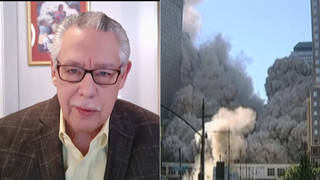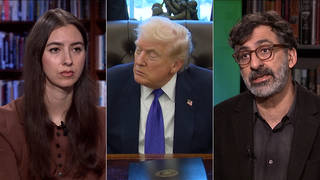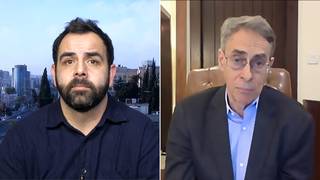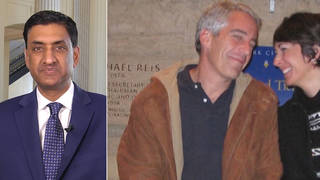
We speak with a Salvadoran journalist who fled El Salvador along with others from the acclaimed news outlet El Faro after Salvadoran President Nayib Bukele threatened to arrest them for exposing how Bukele had made secret deals with Salvadoran gangs. Bukele has run the country under a so-called state of exception since 2022, detaining nearly 80,000 people accused of being in gangs, largely without access to due process. “We don’t know when we will be able to come back,” says Nelson Rauda Zablah, digital editor for El Faro, who notes it is now routine for Bukele’s critics to flee for fear of retaliation. He discusses El Faro's reporting, and we feature excerpts from their interview series with two former leaders of the 18th Street Revolucionarios on Bukele's yearslong relationship to gangs. All of this comes as Bukele is working closely with the Trump administration to jail immigrants sent from the United States at CECOT, El Salvador’s notorious Terrorism Confinement Center.
Transcript
AMY GOODMAN: This is Democracy Now!, democracynow.org, The War and Peace Report. I’m Amy Goodman, with Juan González.
We turn now to a journalist from El Salvador who’s left the country along with others from the digital news outlet El Faro, after the Salvadoran President Nayib Bukele threatened to arrest them all. The outlet reported, quote, “A reliable source in El Salvador told El Faro that the Bukele-controlled Attorney General’s Office is preparing at least seven arrest warrants for members of El Faro … following the publication of an interview with two former leaders of the 18th Street Revolucionarios on Bukele’s years-long relationship to gangs.”
Bukele has run the country under a so-called state of exception since 2022, supposedly in order to weaken these same gangs. And Salvadoran authorities have detained nearly 80,000 people accused of being in gangs, largely without access to due process. Human rights groups report at least 250 people have died in El Salvador prisons since Bukele’s so-called war on gangs began. This comes as Bukele is working closely with the Trump administration to jail immigrants sent from the United States at CECOT, El Salvador’s notorious so-called Terrorism Confinement Center, the mega-prison.
In a moment, we’ll be joined by El Faro’s digital editor, in exile. But first, this is a clip from one of El Faro interviews with a gang member. In it, we hear how just one month into the state of exception in El Salvador back in 2022, despite having an arrest warrant and being recognized as a clear leader of the 18th Street Revolucionarios, “Charli” Cartagena was detained and then released after a mysterious phone call. This is Cartagena.
CARLOS ”CHARLI” CARTAGENA: [translated] I’m telling you all this. That’s a substation in Antiguo Cuscatlán, so that’s not a jail. You’re really in there. And they had already taken my photo before. They were writing it up. I only heard when he told him, the manager there. “Did you already post the news?” he said. “Not yet. I’m about to post it.” “Cancel it,” he told him. “Cancel it. Not right now.” And they stood there. Why? And this and that, and he said, “Oh well, those words are coming from up top.”
CARLOS MARTÍNEZ: [translated] From up top?
CARLOS ”CHARLI” CARTAGENA: [translated] There’s nothing we can do. And suddenly, the call came in, man. I mean, the call came in, and they just stared at me and said, “Take the handcuffs off him.”
AMY GOODMAN: Under President Bukele, the fall of El Salvador’s murder rate has been accompanied by a rise in forced disappearances. This point came up in El Faro's interview with a former Barrio 18 gang member who goes by “Liro Man,” explaining how they carried out orders for handling murders allegedly under the direction of the chairman of Bukele's Social Fabric Reconstruction Unit.
“LIRO”: [translated] What’s that, look, man, gosh, talking to you about these points is very delicate, man, because it’s like making myself worthy of something that maybe I do know, but I can’t tell you, because that’s how it is. Do you understand me? I’m not going to tell you, “There’s never been a homicide,” but it was said with Marroquín: “If something is done, without a body, there’s no crime.” That tells you everything. That tells you everything. Without a body, there is no crime.
AMY GOODMAN: “No body, no crime.” For more, we’re joined from an undisclosed location by Nelson Rauda Zablah, digital content editor for El Faro. Nelson, along with six other colleagues, faces potential arrest warrants for their reporting on Bukele’s dealings with Salvadoran gangs. His new opinion piece for The New York Times is headlined “The World Is Finally Seeing How Dangerous Bukele Really Is.”
Nelson, welcome to Democracy Now! Explain why you and your colleagues have left El Salvador, and the significance of this video that you released, what it says about the president of El Salvador.
NELSON RAUDA ZABLAH: Good morning, Amy. Thank you very much for having me.
Well, you’re talking about America’s prime security consultant at the moment. The president, President Bukele, is a man who says to be working for the securities of all people and has offered to solve the world’s security problems. Not long ago, he offered to lead a mission to Haiti. And he’s selling these services, because he supposedly has the solution for the world’s security problems.
What we’re doing is piercing the bubble. We’re telling a story that’s so different from that narrative, from the propaganda, because the man who says he has the solution for the gangs problem has actually made secret dealings with him all throughout his rise through political offices, way before he was a president, but even now that he is a president.
So, yeah, we’re dealing with the consequences now. A Salvadoran prison is the last place that you want to be in. So I exited the country. I left El Salvador one day before the publication. And this is something that we have done routinely in El Faro, to exit the country, not only us, all journalists in Salvador, leaving the country to wait for the retaliation or the consequences or the reaction of the government from afar, from a distance. So we left the country. And yeah, right now we don’t know when we will be able to come back. We don’t know. We have our whole lives in El Salvador. We have families, and our job is there, and houses. But we’re trying to make sure that we are safe first.
And I think that’s the significance, that we would not be facing this price if what we published was not as important as it is. It’s telling the world that the president who says he’s the — that has the panacea for security, has actually been making secret deals with gangsters, with organizations that the U.S. considers terrorists.
And when they tell it all, the videos have a great impact in Salvadoran society. They have over 1.5 million views in a country that’s inhabited by 6 million people. This has really pierced through the bubble with an analysis that says that more people saw the videos than people voted for the opposition in the last Salvadoran election.
So, that’s the story we’re telling, and we’re grateful to be able to tell it, because American people should know that their government is doing dealings with someone who has been making deals with criminals.
JUAN GONZÁLEZ: And, Nelson, it’s not just your reporting on this, but back in 2021, the U.S. Treasury Department itself sanctioned two Bukele officials, accusing them both of negotiating with notorious local gangs in an attempt to seal a secret truce and shore up political support for Bukele. Can you talk about this? And who exactly is one of those officials, Carlos Marroquín, and his connection to the gangs and Bukele?
NELSON RAUDA ZABLAH: Carlos Marroquín is Bukele’s designated man to deal with the gangs. He has done this job for Bukele before he was the president. He did it when he was running for San Salvador mayor. And he has stood throughout.
But we found now that Carlos Marroquín, in at least two different cases, personally transported gang members, you know, indicted with arrest orders, to the border with Guatemala. And we know this because Carlos Marroquín confessed it in an audio that we published, an audio that he sent to a gang member and that we published back in 2021.
So, I think Bukele’s negotiation with the deals is not something — you know, it’s not a reported story; it’s a fact. It’s a fact that’s been proven, not only by journalistic investigation, like the one that we made ourself, not only by the U.S. authorities, like the State Department and the Treasury Department, sanctioning not only Marroquín, but also Osiris Luna, who is the director of prisons, and also proven by a Salvadoran criminal investigation that is now [inaudible], because Bukele, Bukele’s party removed the attorney general who was investigating him and his party and his officials, and put in place another one, the one that’s made arrest warrants against us.
So, you’re talking about a dictatorship, and you’re talking about — CNN reported last week that Bukele’s brother, Ibrajim Bukele, said in an email that he wanted to — he wanted the return of seven MS-13 leaders, and that in exchange he would be able to offer a 50% discount in the price that El Salvador charges to have Venezuelan prisoners and other prisoners deported to CECOT by El Salvador. Why is the Bukele government so invested, so interested in having these gang leaders removed, when it’s them that they let them go? That’s the — the government has accused us, and a lot of the speakers for the government have accused us, of collaborating with the gangs, when it’s so blatantly obvious that we wouldn’t have been able to arrest Charli — to interview Charli if they wouldn’t have released him. He was in jail. He was already arrested. He’s supposed to be in jail. The only reason that we were able to interview him is that the government released him. And the fact having him on camera is a living proof that Bukele dealt with the gangs. And this goes so much against the narrative that he is, you know, this protector of Salvadoran people, because he has been making secret dealings behind their back. And we are just pulling that to light.
JUAN GONZÁLEZ: Well, we only have 30 seconds, but what has been the response by the people in El Salvador to the revelations of your news site?
NELSON RAUDA ZABLAH: El Salvador is in a great state of turmoil now, one of the reasons being this publication, but there’s so many problems. I just want to say before I finish that I’m here speaking because there are many others that cannot speak — because Alejandro Henríquez, who was arrested last night in El Salvador, cannot speak right now; because Roberto Jaco, who died in a prison last night after being arrested in — last week, after being arrested by the government, can’t speak right now; because the Pastor Ángel Pérez cannot speak right now. We’re telling a story [inaudible] —
AMY GOODMAN: Nelson Rauda Zablah, we have to go, but we’re going to continue this conversation in Spanish at democracynow.org, digital editor for El Faro.













Media Options